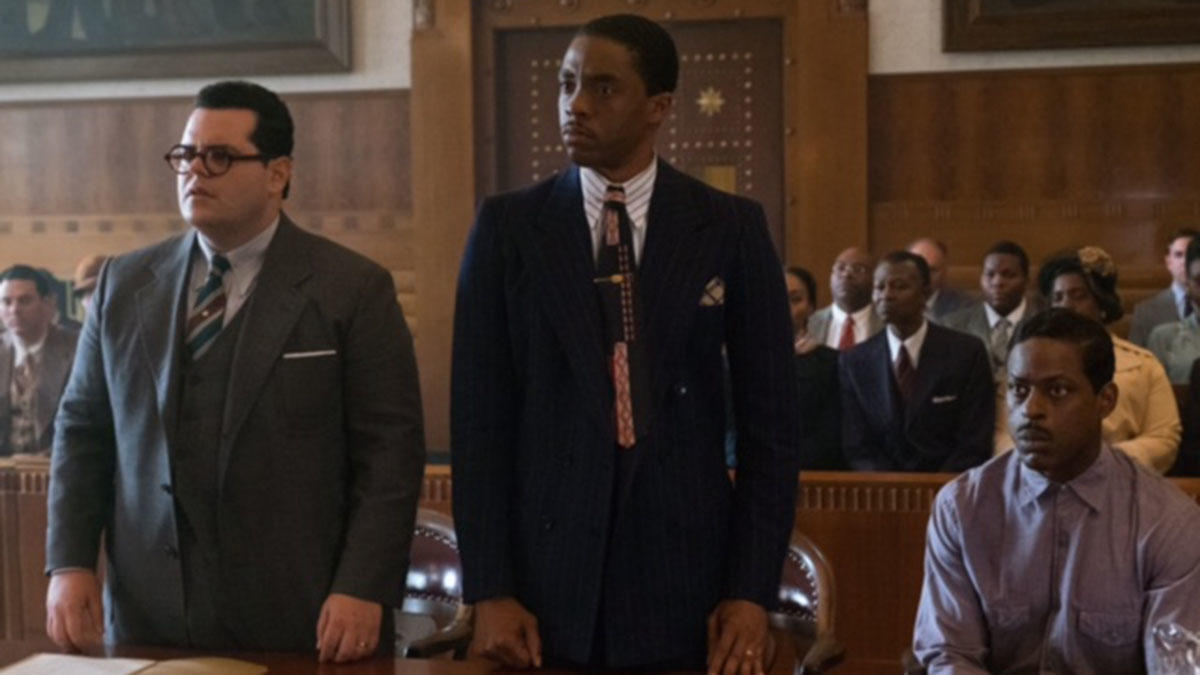By Mark Saldana
Rating: 3 (Out of 4 Stars)
Even though the 13th Amendment of the US Constitution abolished slavery and made the former slaves free citizens, African-Americans to this very day face prejudices in the legal system. Of course this is not for a lack of trying and fighting for fairness. Established in 1940, the NAACP Legal Defense and Educational Fund has fought this battle for decades and continues to do so today. Attorney Thurgood Marshall served the LDEF for many years, traveling all over the United States defending the legal rights of African-American citizens who could not afford to pay for proper defense and would easily fall victim to the prejudices of law enforcement and the courts. A new film by director Reginald Hudlin focuses on the hard of work of Marshall, particularly in one controversial criminal case that seemed unwinnable by the defendant. With an elegant and powerful performance by Chadwick Boseman, Marshall attempts to honor and celebrate the eventual Supreme Court Justice, and mostly succeeds.
During the 1940s, the NAACP LDEF had a superstar attorney in Thurgood Marshall. The attorney was in great demand, as he proved himself as an intelligent and eloquent litigator who could at least guarantee African American criminal suspects fairer trials than they would get without him. In the film’s story, Marshall and his loving wife Buster (Keesha Sharp) barely spend any time together, as his organization has him traveling constantly rushing to the aid of Black people needing legal assistance. Marshall gets sent to Bridgeport, Connecticut to defend Joseph Spell (Sterling K. Brown), a Black chauffeur charged with the rape and attempted murder of Eleanor Strubbing (Kate Hudson). As Marshall isn’t licensed to practice in the state of Connecticut, he gets forced to work with lawyer Sam Friedman (Joshua Gad), an insurance attorney with minimal litigation experience. Marshall, Friedman, and Spell must battle the prejudices of Judge Foster (James Cromwell), prosecuting attorney Loren Willis (Dan Stevens), and the general public. They must also deal with their own weaknesses and fears to stand a wining chance in a tremendously difficult trial.
Written by Jacob and Michael Koskoff, Reginald Hudlin’s Marshall may have the typical elements of court room dramas, but does deal with some subjects and issues that are sadly still relevant today. Though racism is not quite as bad as it was during the 1940s, the numbers of African-Americans in prisons is still startling. The Koskoffs have written a very thorough and solidly developed screenplay that deals with the many facets of racism in the legal system. This includes the ease in which suspects often claim responsibility for crimes they didn’t commit merely to avoid harsh sentences. Hudlin does a great job presenting the story with great skill and flair and owes some of this to the adept editing by Tom McArdle and the beautiful cinematography by Thomas Newton Sigel.
The film’s intended impact hits home mainly because of the passionate and powerful performance of Chadwick Boseman. Boseman, who has already superbly portrayed African-American icons Jackie Robinson (42) and James Brown (Get on Up), offers another extraordinary turn in the title role. Boseman works well with Joshua Gad who performs perfectly as the shy and reluctant insurance attorney-turned-criminal litigator Sam Friedman. Sterling K. Brown, who stars as defendant Joseph Spell, offers a poignant and nearly heartbreaking performance. The movie also has admirable work by Keesha Sharp, Kate Hudson, Dan Stevens, and James Cromwell.
So as far as court room dramas go, Marshall doesn’t do anything that audiences haven’t already seen in other movies, but does pack a wallop with the social and historical relevance of its story inspiration. It is because of this historical relevance, its resonance to problems in our courts today and because of the fantastic performances by the cast that I must recommend this movie. Thurgood Marshall was an amazing person who worked tremendously hard and relentlessly for human rights. He, of course, eventually was appointed as the first Black Justice of the US Supreme Court. He was a person of historical significance deserving high regard and respect for his work against racial prejudice in the United States.
